The Developing Manager: Management Behaviour and Career Planning
VerifiedAdded on 2024/05/29
|15
|4972
|131
Essay
AI Summary
This essay delves into the principles and practices of management behavior, focusing on personal development and career growth in the context of the hospitality and tourism industry, with specific examples from Hilton Hotel and Thomas Cook. It compares different management styles, discusses leadership characteristics, evaluates communication processes, and analyzes organizational culture and change. The essay also assesses the author's own management skills and potential, emphasizing the importance of communication, team orientation, charisma, and creativity. Furthermore, it addresses the need for continuous self-improvement and outlines a plan for developing personal and managerial skills to support career advancement, while reviewing its viability in the future based on current performance standards. The analysis covers formal and informal communication, upward, downward, and horizontal communication, and verbal and written communication, highlighting the barriers that can hinder effective communication. Finally, it touches on power culture, role culture, and task culture within organizations.
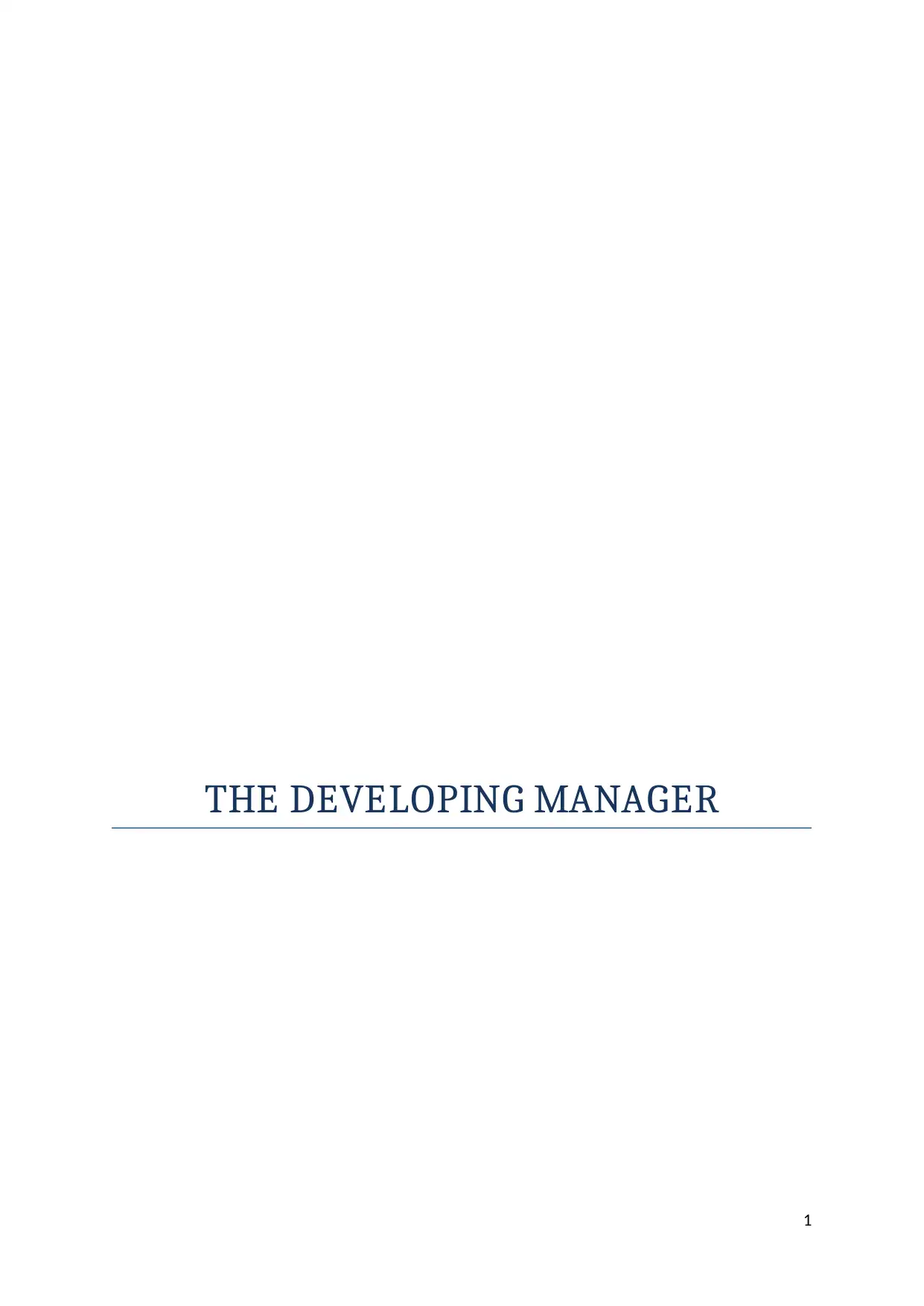
THE DEVELOPING MANAGER
1
1
Paraphrase This Document
Need a fresh take? Get an instant paraphrase of this document with our AI Paraphraser
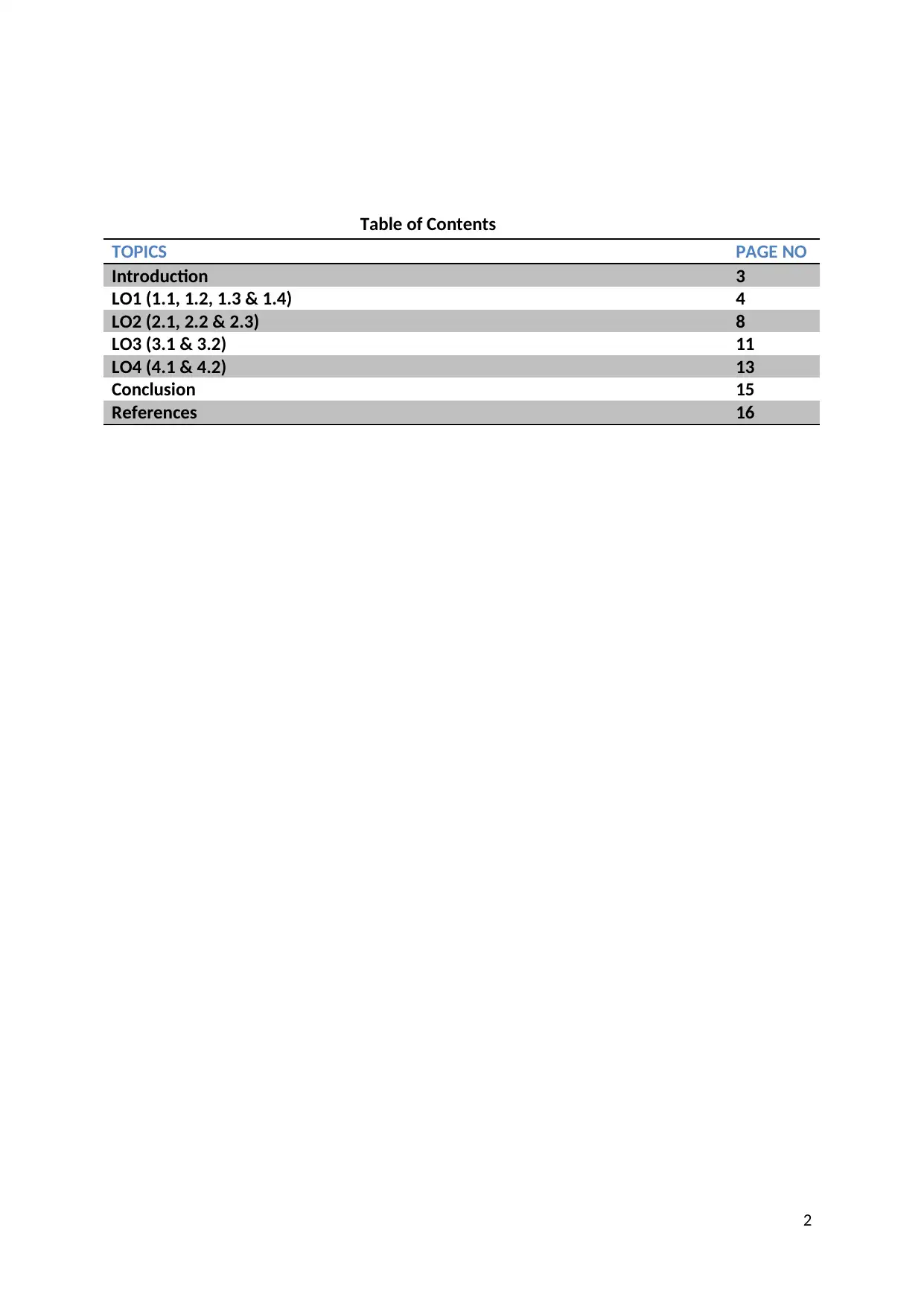
Table of Contents
TOPICS PAGE NO
Introduction 3
LO1 (1.1, 1.2, 1.3 & 1.4) 4
LO2 (2.1, 2.2 & 2.3) 8
LO3 (3.1 & 3.2) 11
LO4 (4.1 & 4.2) 13
Conclusion 15
References 16
2
TOPICS PAGE NO
Introduction 3
LO1 (1.1, 1.2, 1.3 & 1.4) 4
LO2 (2.1, 2.2 & 2.3) 8
LO3 (3.1 & 3.2) 11
LO4 (4.1 & 4.2) 13
Conclusion 15
References 16
2
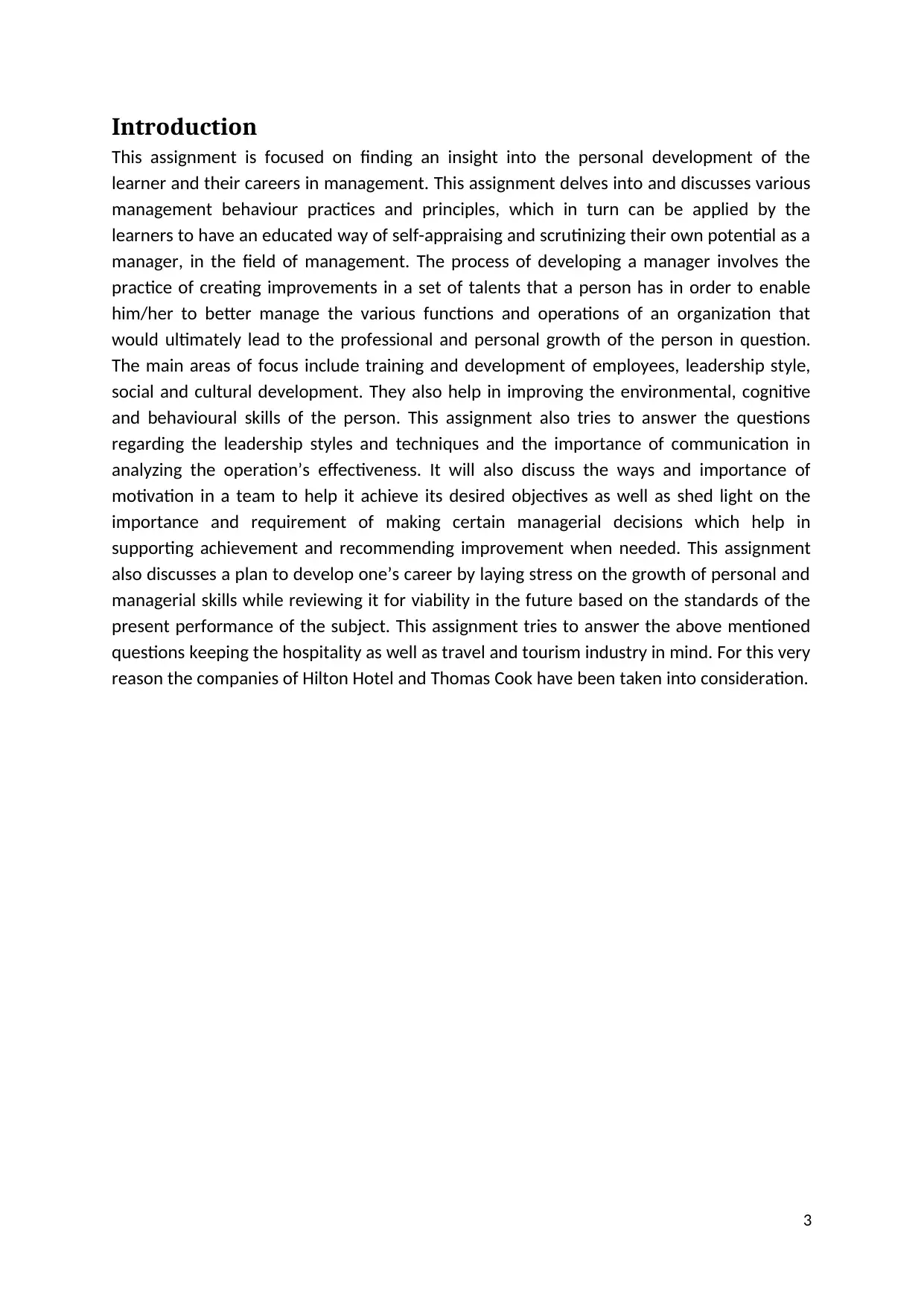
Introduction
This assignment is focused on finding an insight into the personal development of the
learner and their careers in management. This assignment delves into and discusses various
management behaviour practices and principles, which in turn can be applied by the
learners to have an educated way of self-appraising and scrutinizing their own potential as a
manager, in the field of management. The process of developing a manager involves the
practice of creating improvements in a set of talents that a person has in order to enable
him/her to better manage the various functions and operations of an organization that
would ultimately lead to the professional and personal growth of the person in question.
The main areas of focus include training and development of employees, leadership style,
social and cultural development. They also help in improving the environmental, cognitive
and behavioural skills of the person. This assignment also tries to answer the questions
regarding the leadership styles and techniques and the importance of communication in
analyzing the operation’s effectiveness. It will also discuss the ways and importance of
motivation in a team to help it achieve its desired objectives as well as shed light on the
importance and requirement of making certain managerial decisions which help in
supporting achievement and recommending improvement when needed. This assignment
also discusses a plan to develop one’s career by laying stress on the growth of personal and
managerial skills while reviewing it for viability in the future based on the standards of the
present performance of the subject. This assignment tries to answer the above mentioned
questions keeping the hospitality as well as travel and tourism industry in mind. For this very
reason the companies of Hilton Hotel and Thomas Cook have been taken into consideration.
3
This assignment is focused on finding an insight into the personal development of the
learner and their careers in management. This assignment delves into and discusses various
management behaviour practices and principles, which in turn can be applied by the
learners to have an educated way of self-appraising and scrutinizing their own potential as a
manager, in the field of management. The process of developing a manager involves the
practice of creating improvements in a set of talents that a person has in order to enable
him/her to better manage the various functions and operations of an organization that
would ultimately lead to the professional and personal growth of the person in question.
The main areas of focus include training and development of employees, leadership style,
social and cultural development. They also help in improving the environmental, cognitive
and behavioural skills of the person. This assignment also tries to answer the questions
regarding the leadership styles and techniques and the importance of communication in
analyzing the operation’s effectiveness. It will also discuss the ways and importance of
motivation in a team to help it achieve its desired objectives as well as shed light on the
importance and requirement of making certain managerial decisions which help in
supporting achievement and recommending improvement when needed. This assignment
also discusses a plan to develop one’s career by laying stress on the growth of personal and
managerial skills while reviewing it for viability in the future based on the standards of the
present performance of the subject. This assignment tries to answer the above mentioned
questions keeping the hospitality as well as travel and tourism industry in mind. For this very
reason the companies of Hilton Hotel and Thomas Cook have been taken into consideration.
3
⊘ This is a preview!⊘
Do you want full access?
Subscribe today to unlock all pages.

Trusted by 1+ million students worldwide
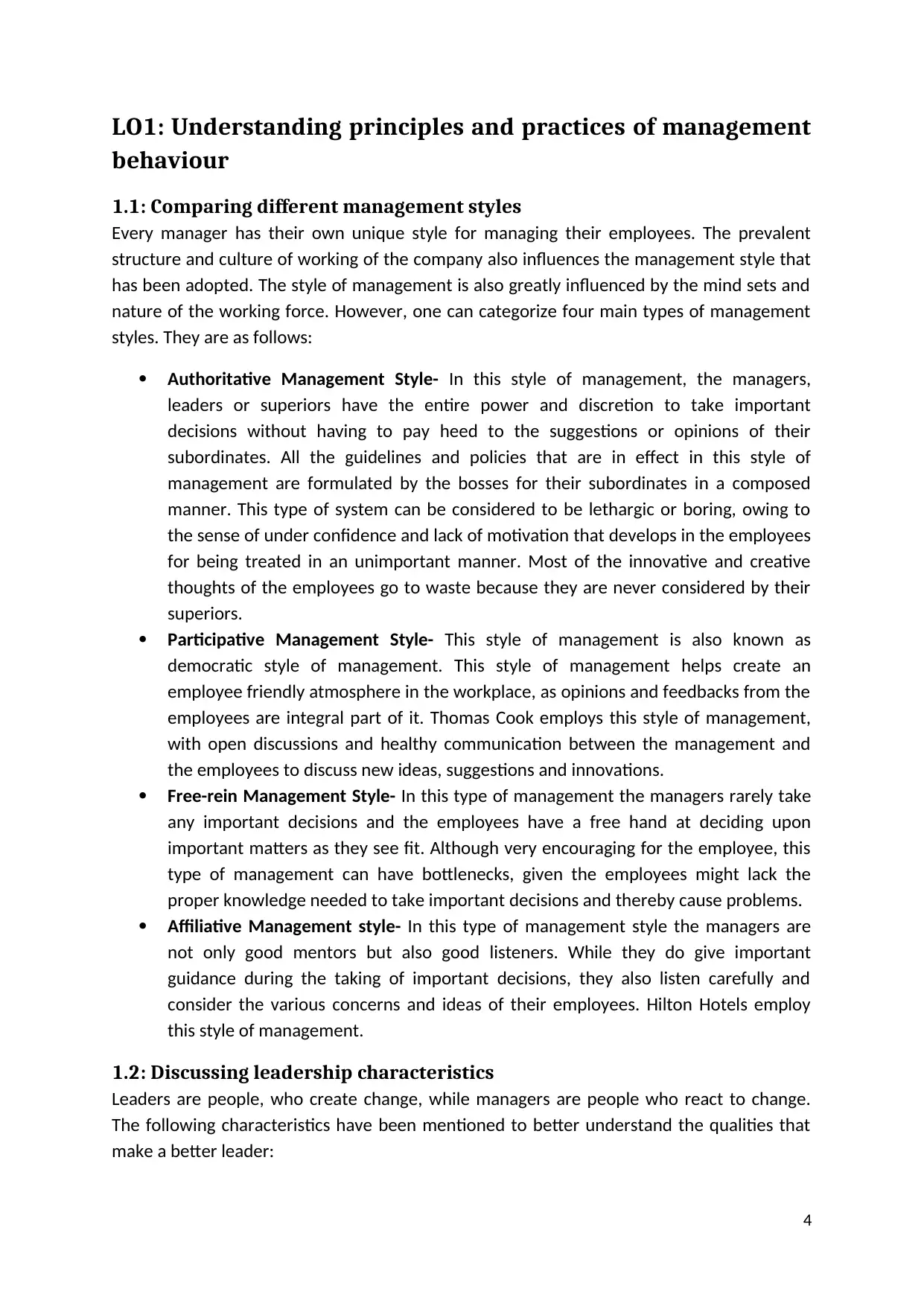
LO1: Understanding principles and practices of management
behaviour
1.1: Comparing different management styles
Every manager has their own unique style for managing their employees. The prevalent
structure and culture of working of the company also influences the management style that
has been adopted. The style of management is also greatly influenced by the mind sets and
nature of the working force. However, one can categorize four main types of management
styles. They are as follows:
Authoritative Management Style- In this style of management, the managers,
leaders or superiors have the entire power and discretion to take important
decisions without having to pay heed to the suggestions or opinions of their
subordinates. All the guidelines and policies that are in effect in this style of
management are formulated by the bosses for their subordinates in a composed
manner. This type of system can be considered to be lethargic or boring, owing to
the sense of under confidence and lack of motivation that develops in the employees
for being treated in an unimportant manner. Most of the innovative and creative
thoughts of the employees go to waste because they are never considered by their
superiors.
Participative Management Style- This style of management is also known as
democratic style of management. This style of management helps create an
employee friendly atmosphere in the workplace, as opinions and feedbacks from the
employees are integral part of it. Thomas Cook employs this style of management,
with open discussions and healthy communication between the management and
the employees to discuss new ideas, suggestions and innovations.
Free-rein Management Style- In this type of management the managers rarely take
any important decisions and the employees have a free hand at deciding upon
important matters as they see fit. Although very encouraging for the employee, this
type of management can have bottlenecks, given the employees might lack the
proper knowledge needed to take important decisions and thereby cause problems.
Affiliative Management style- In this type of management style the managers are
not only good mentors but also good listeners. While they do give important
guidance during the taking of important decisions, they also listen carefully and
consider the various concerns and ideas of their employees. Hilton Hotels employ
this style of management.
1.2: Discussing leadership characteristics
Leaders are people, who create change, while managers are people who react to change.
The following characteristics have been mentioned to better understand the qualities that
make a better leader:
4
behaviour
1.1: Comparing different management styles
Every manager has their own unique style for managing their employees. The prevalent
structure and culture of working of the company also influences the management style that
has been adopted. The style of management is also greatly influenced by the mind sets and
nature of the working force. However, one can categorize four main types of management
styles. They are as follows:
Authoritative Management Style- In this style of management, the managers,
leaders or superiors have the entire power and discretion to take important
decisions without having to pay heed to the suggestions or opinions of their
subordinates. All the guidelines and policies that are in effect in this style of
management are formulated by the bosses for their subordinates in a composed
manner. This type of system can be considered to be lethargic or boring, owing to
the sense of under confidence and lack of motivation that develops in the employees
for being treated in an unimportant manner. Most of the innovative and creative
thoughts of the employees go to waste because they are never considered by their
superiors.
Participative Management Style- This style of management is also known as
democratic style of management. This style of management helps create an
employee friendly atmosphere in the workplace, as opinions and feedbacks from the
employees are integral part of it. Thomas Cook employs this style of management,
with open discussions and healthy communication between the management and
the employees to discuss new ideas, suggestions and innovations.
Free-rein Management Style- In this type of management the managers rarely take
any important decisions and the employees have a free hand at deciding upon
important matters as they see fit. Although very encouraging for the employee, this
type of management can have bottlenecks, given the employees might lack the
proper knowledge needed to take important decisions and thereby cause problems.
Affiliative Management style- In this type of management style the managers are
not only good mentors but also good listeners. While they do give important
guidance during the taking of important decisions, they also listen carefully and
consider the various concerns and ideas of their employees. Hilton Hotels employ
this style of management.
1.2: Discussing leadership characteristics
Leaders are people, who create change, while managers are people who react to change.
The following characteristics have been mentioned to better understand the qualities that
make a better leader:
4
Paraphrase This Document
Need a fresh take? Get an instant paraphrase of this document with our AI Paraphraser
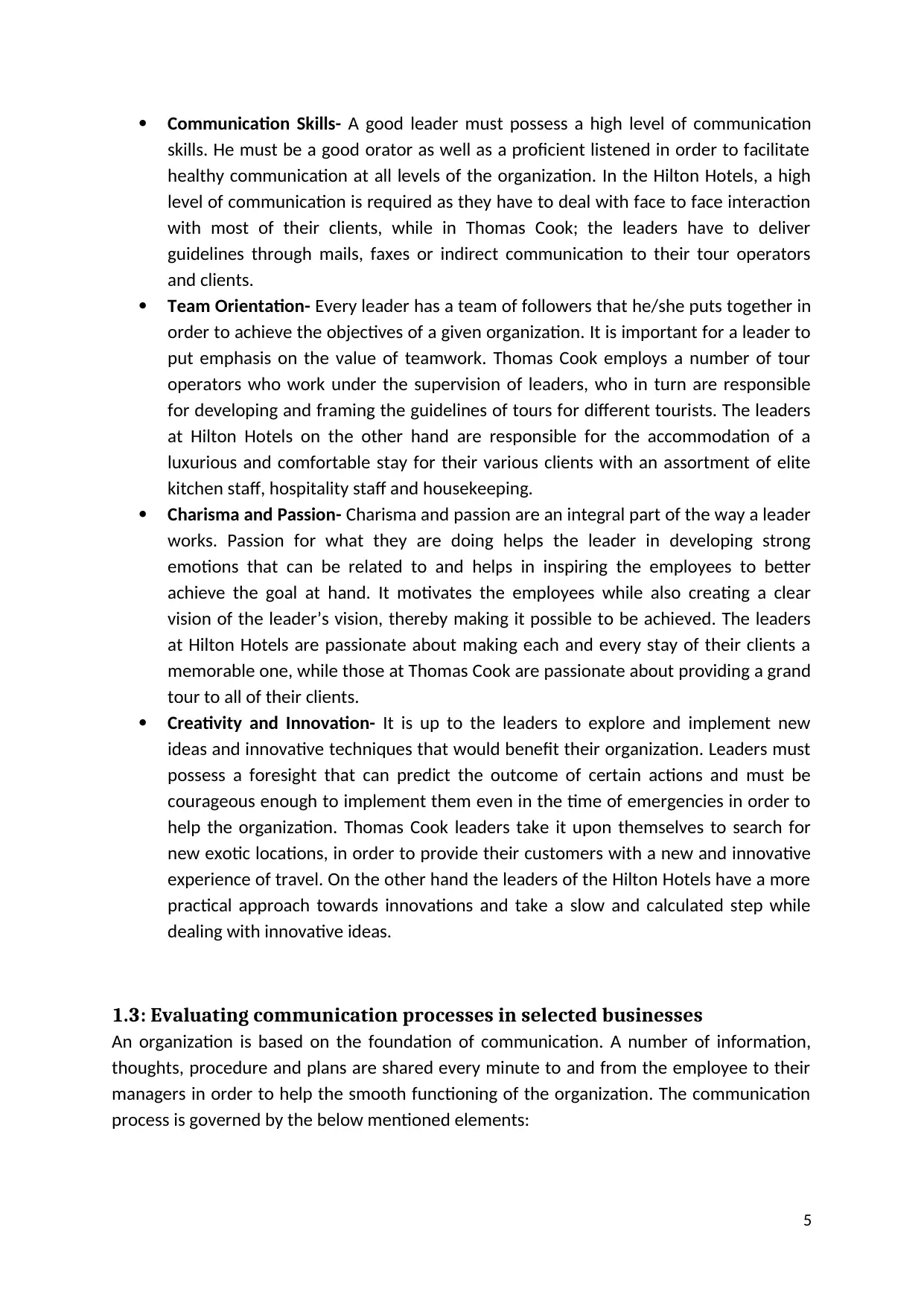
Communication Skills- A good leader must possess a high level of communication
skills. He must be a good orator as well as a proficient listened in order to facilitate
healthy communication at all levels of the organization. In the Hilton Hotels, a high
level of communication is required as they have to deal with face to face interaction
with most of their clients, while in Thomas Cook; the leaders have to deliver
guidelines through mails, faxes or indirect communication to their tour operators
and clients.
Team Orientation- Every leader has a team of followers that he/she puts together in
order to achieve the objectives of a given organization. It is important for a leader to
put emphasis on the value of teamwork. Thomas Cook employs a number of tour
operators who work under the supervision of leaders, who in turn are responsible
for developing and framing the guidelines of tours for different tourists. The leaders
at Hilton Hotels on the other hand are responsible for the accommodation of a
luxurious and comfortable stay for their various clients with an assortment of elite
kitchen staff, hospitality staff and housekeeping.
Charisma and Passion- Charisma and passion are an integral part of the way a leader
works. Passion for what they are doing helps the leader in developing strong
emotions that can be related to and helps in inspiring the employees to better
achieve the goal at hand. It motivates the employees while also creating a clear
vision of the leader’s vision, thereby making it possible to be achieved. The leaders
at Hilton Hotels are passionate about making each and every stay of their clients a
memorable one, while those at Thomas Cook are passionate about providing a grand
tour to all of their clients.
Creativity and Innovation- It is up to the leaders to explore and implement new
ideas and innovative techniques that would benefit their organization. Leaders must
possess a foresight that can predict the outcome of certain actions and must be
courageous enough to implement them even in the time of emergencies in order to
help the organization. Thomas Cook leaders take it upon themselves to search for
new exotic locations, in order to provide their customers with a new and innovative
experience of travel. On the other hand the leaders of the Hilton Hotels have a more
practical approach towards innovations and take a slow and calculated step while
dealing with innovative ideas.
1.3: Evaluating communication processes in selected businesses
An organization is based on the foundation of communication. A number of information,
thoughts, procedure and plans are shared every minute to and from the employee to their
managers in order to help the smooth functioning of the organization. The communication
process is governed by the below mentioned elements:
5
skills. He must be a good orator as well as a proficient listened in order to facilitate
healthy communication at all levels of the organization. In the Hilton Hotels, a high
level of communication is required as they have to deal with face to face interaction
with most of their clients, while in Thomas Cook; the leaders have to deliver
guidelines through mails, faxes or indirect communication to their tour operators
and clients.
Team Orientation- Every leader has a team of followers that he/she puts together in
order to achieve the objectives of a given organization. It is important for a leader to
put emphasis on the value of teamwork. Thomas Cook employs a number of tour
operators who work under the supervision of leaders, who in turn are responsible
for developing and framing the guidelines of tours for different tourists. The leaders
at Hilton Hotels on the other hand are responsible for the accommodation of a
luxurious and comfortable stay for their various clients with an assortment of elite
kitchen staff, hospitality staff and housekeeping.
Charisma and Passion- Charisma and passion are an integral part of the way a leader
works. Passion for what they are doing helps the leader in developing strong
emotions that can be related to and helps in inspiring the employees to better
achieve the goal at hand. It motivates the employees while also creating a clear
vision of the leader’s vision, thereby making it possible to be achieved. The leaders
at Hilton Hotels are passionate about making each and every stay of their clients a
memorable one, while those at Thomas Cook are passionate about providing a grand
tour to all of their clients.
Creativity and Innovation- It is up to the leaders to explore and implement new
ideas and innovative techniques that would benefit their organization. Leaders must
possess a foresight that can predict the outcome of certain actions and must be
courageous enough to implement them even in the time of emergencies in order to
help the organization. Thomas Cook leaders take it upon themselves to search for
new exotic locations, in order to provide their customers with a new and innovative
experience of travel. On the other hand the leaders of the Hilton Hotels have a more
practical approach towards innovations and take a slow and calculated step while
dealing with innovative ideas.
1.3: Evaluating communication processes in selected businesses
An organization is based on the foundation of communication. A number of information,
thoughts, procedure and plans are shared every minute to and from the employee to their
managers in order to help the smooth functioning of the organization. The communication
process is governed by the below mentioned elements:
5
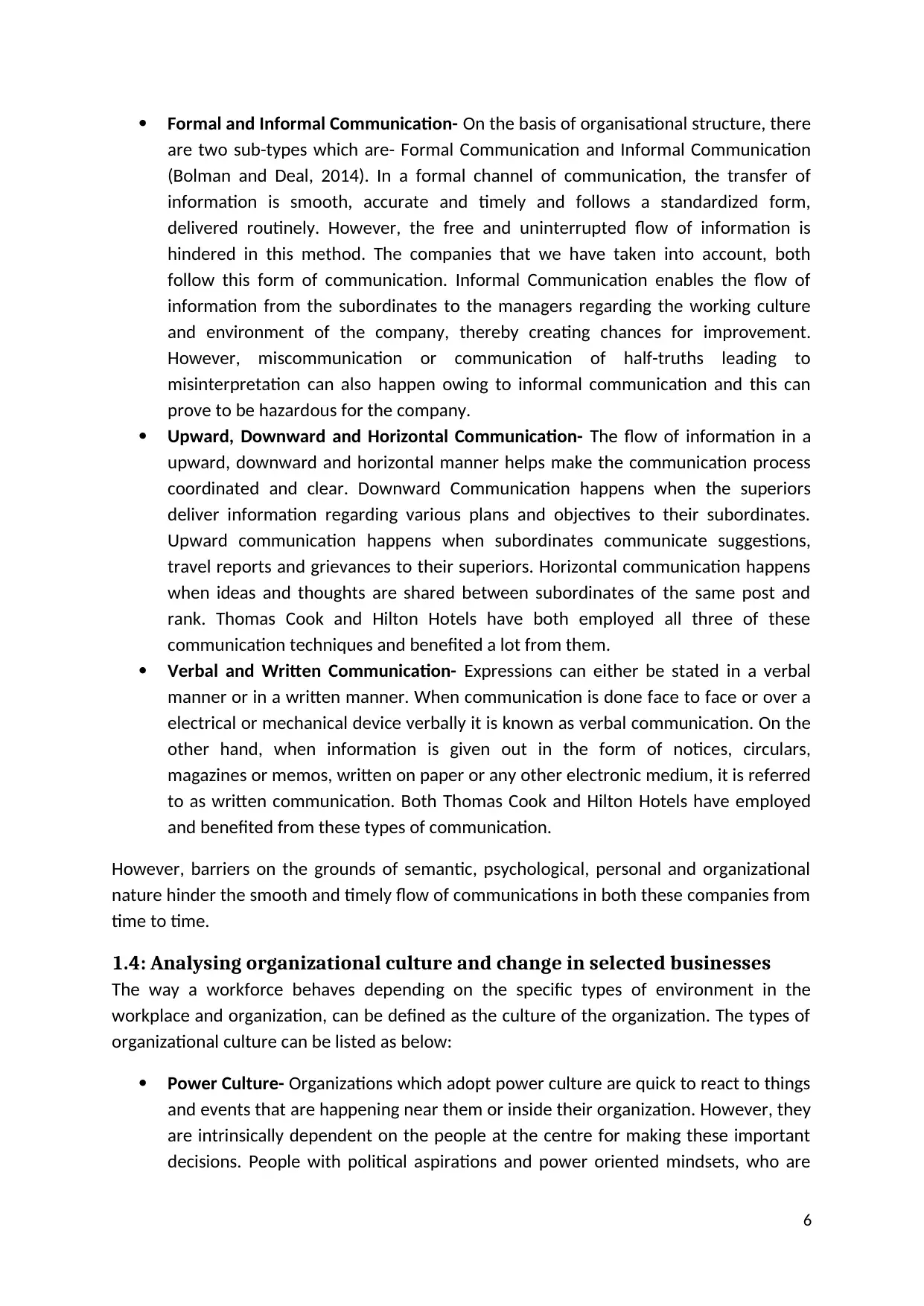
Formal and Informal Communication- On the basis of organisational structure, there
are two sub-types which are- Formal Communication and Informal Communication
(Bolman and Deal, 2014). In a formal channel of communication, the transfer of
information is smooth, accurate and timely and follows a standardized form,
delivered routinely. However, the free and uninterrupted flow of information is
hindered in this method. The companies that we have taken into account, both
follow this form of communication. Informal Communication enables the flow of
information from the subordinates to the managers regarding the working culture
and environment of the company, thereby creating chances for improvement.
However, miscommunication or communication of half-truths leading to
misinterpretation can also happen owing to informal communication and this can
prove to be hazardous for the company.
Upward, Downward and Horizontal Communication- The flow of information in a
upward, downward and horizontal manner helps make the communication process
coordinated and clear. Downward Communication happens when the superiors
deliver information regarding various plans and objectives to their subordinates.
Upward communication happens when subordinates communicate suggestions,
travel reports and grievances to their superiors. Horizontal communication happens
when ideas and thoughts are shared between subordinates of the same post and
rank. Thomas Cook and Hilton Hotels have both employed all three of these
communication techniques and benefited a lot from them.
Verbal and Written Communication- Expressions can either be stated in a verbal
manner or in a written manner. When communication is done face to face or over a
electrical or mechanical device verbally it is known as verbal communication. On the
other hand, when information is given out in the form of notices, circulars,
magazines or memos, written on paper or any other electronic medium, it is referred
to as written communication. Both Thomas Cook and Hilton Hotels have employed
and benefited from these types of communication.
However, barriers on the grounds of semantic, psychological, personal and organizational
nature hinder the smooth and timely flow of communications in both these companies from
time to time.
1.4: Analysing organizational culture and change in selected businesses
The way a workforce behaves depending on the specific types of environment in the
workplace and organization, can be defined as the culture of the organization. The types of
organizational culture can be listed as below:
Power Culture- Organizations which adopt power culture are quick to react to things
and events that are happening near them or inside their organization. However, they
are intrinsically dependent on the people at the centre for making these important
decisions. People with political aspirations and power oriented mindsets, who are
6
are two sub-types which are- Formal Communication and Informal Communication
(Bolman and Deal, 2014). In a formal channel of communication, the transfer of
information is smooth, accurate and timely and follows a standardized form,
delivered routinely. However, the free and uninterrupted flow of information is
hindered in this method. The companies that we have taken into account, both
follow this form of communication. Informal Communication enables the flow of
information from the subordinates to the managers regarding the working culture
and environment of the company, thereby creating chances for improvement.
However, miscommunication or communication of half-truths leading to
misinterpretation can also happen owing to informal communication and this can
prove to be hazardous for the company.
Upward, Downward and Horizontal Communication- The flow of information in a
upward, downward and horizontal manner helps make the communication process
coordinated and clear. Downward Communication happens when the superiors
deliver information regarding various plans and objectives to their subordinates.
Upward communication happens when subordinates communicate suggestions,
travel reports and grievances to their superiors. Horizontal communication happens
when ideas and thoughts are shared between subordinates of the same post and
rank. Thomas Cook and Hilton Hotels have both employed all three of these
communication techniques and benefited a lot from them.
Verbal and Written Communication- Expressions can either be stated in a verbal
manner or in a written manner. When communication is done face to face or over a
electrical or mechanical device verbally it is known as verbal communication. On the
other hand, when information is given out in the form of notices, circulars,
magazines or memos, written on paper or any other electronic medium, it is referred
to as written communication. Both Thomas Cook and Hilton Hotels have employed
and benefited from these types of communication.
However, barriers on the grounds of semantic, psychological, personal and organizational
nature hinder the smooth and timely flow of communications in both these companies from
time to time.
1.4: Analysing organizational culture and change in selected businesses
The way a workforce behaves depending on the specific types of environment in the
workplace and organization, can be defined as the culture of the organization. The types of
organizational culture can be listed as below:
Power Culture- Organizations which adopt power culture are quick to react to things
and events that are happening near them or inside their organization. However, they
are intrinsically dependent on the people at the centre for making these important
decisions. People with political aspirations and power oriented mindsets, who are
6
⊘ This is a preview!⊘
Do you want full access?
Subscribe today to unlock all pages.

Trusted by 1+ million students worldwide
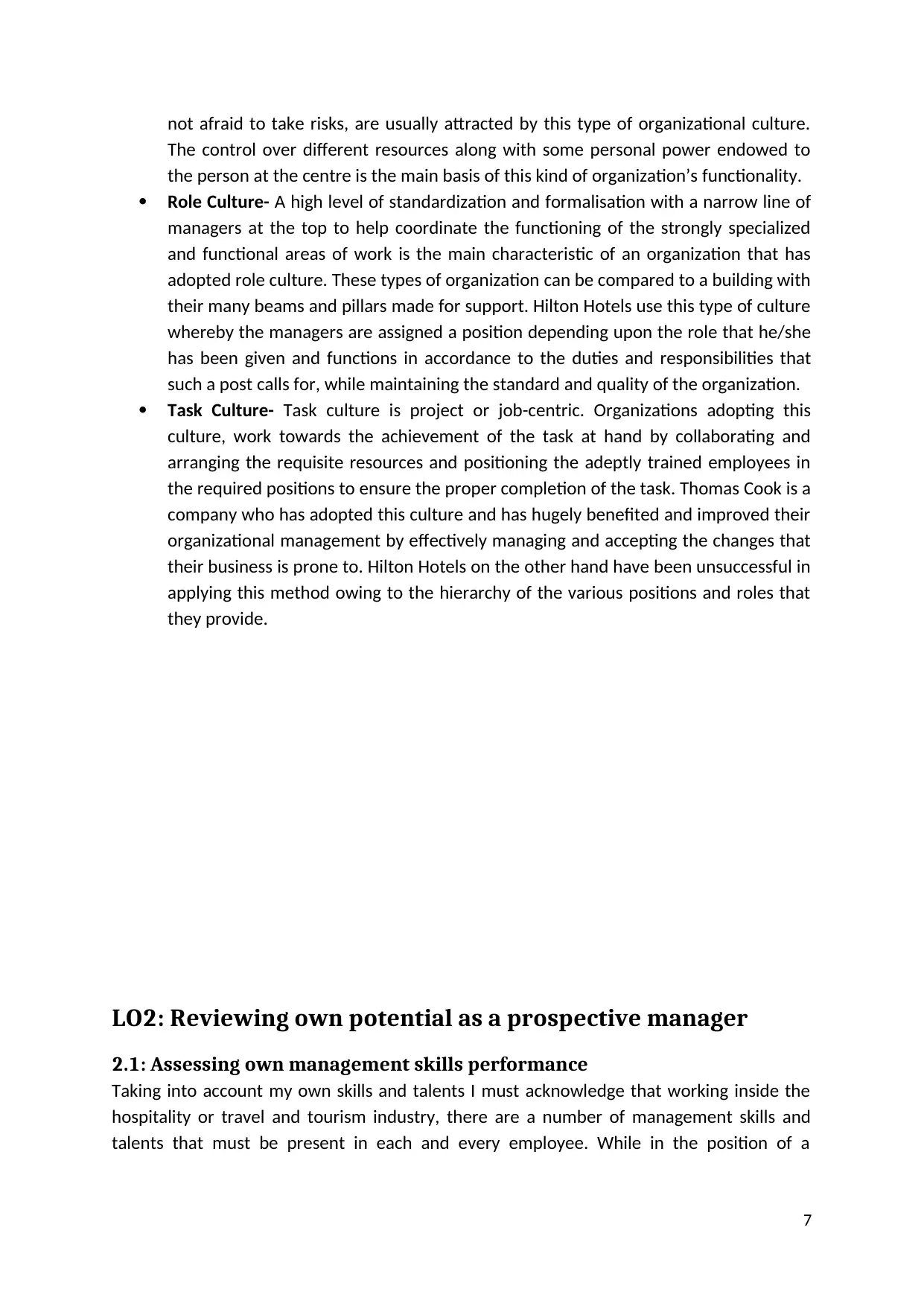
not afraid to take risks, are usually attracted by this type of organizational culture.
The control over different resources along with some personal power endowed to
the person at the centre is the main basis of this kind of organization’s functionality.
Role Culture- A high level of standardization and formalisation with a narrow line of
managers at the top to help coordinate the functioning of the strongly specialized
and functional areas of work is the main characteristic of an organization that has
adopted role culture. These types of organization can be compared to a building with
their many beams and pillars made for support. Hilton Hotels use this type of culture
whereby the managers are assigned a position depending upon the role that he/she
has been given and functions in accordance to the duties and responsibilities that
such a post calls for, while maintaining the standard and quality of the organization.
Task Culture- Task culture is project or job-centric. Organizations adopting this
culture, work towards the achievement of the task at hand by collaborating and
arranging the requisite resources and positioning the adeptly trained employees in
the required positions to ensure the proper completion of the task. Thomas Cook is a
company who has adopted this culture and has hugely benefited and improved their
organizational management by effectively managing and accepting the changes that
their business is prone to. Hilton Hotels on the other hand have been unsuccessful in
applying this method owing to the hierarchy of the various positions and roles that
they provide.
LO2: Reviewing own potential as a prospective manager
2.1: Assessing own management skills performance
Taking into account my own skills and talents I must acknowledge that working inside the
hospitality or travel and tourism industry, there are a number of management skills and
talents that must be present in each and every employee. While in the position of a
7
The control over different resources along with some personal power endowed to
the person at the centre is the main basis of this kind of organization’s functionality.
Role Culture- A high level of standardization and formalisation with a narrow line of
managers at the top to help coordinate the functioning of the strongly specialized
and functional areas of work is the main characteristic of an organization that has
adopted role culture. These types of organization can be compared to a building with
their many beams and pillars made for support. Hilton Hotels use this type of culture
whereby the managers are assigned a position depending upon the role that he/she
has been given and functions in accordance to the duties and responsibilities that
such a post calls for, while maintaining the standard and quality of the organization.
Task Culture- Task culture is project or job-centric. Organizations adopting this
culture, work towards the achievement of the task at hand by collaborating and
arranging the requisite resources and positioning the adeptly trained employees in
the required positions to ensure the proper completion of the task. Thomas Cook is a
company who has adopted this culture and has hugely benefited and improved their
organizational management by effectively managing and accepting the changes that
their business is prone to. Hilton Hotels on the other hand have been unsuccessful in
applying this method owing to the hierarchy of the various positions and roles that
they provide.
LO2: Reviewing own potential as a prospective manager
2.1: Assessing own management skills performance
Taking into account my own skills and talents I must acknowledge that working inside the
hospitality or travel and tourism industry, there are a number of management skills and
talents that must be present in each and every employee. While in the position of a
7
Paraphrase This Document
Need a fresh take? Get an instant paraphrase of this document with our AI Paraphraser
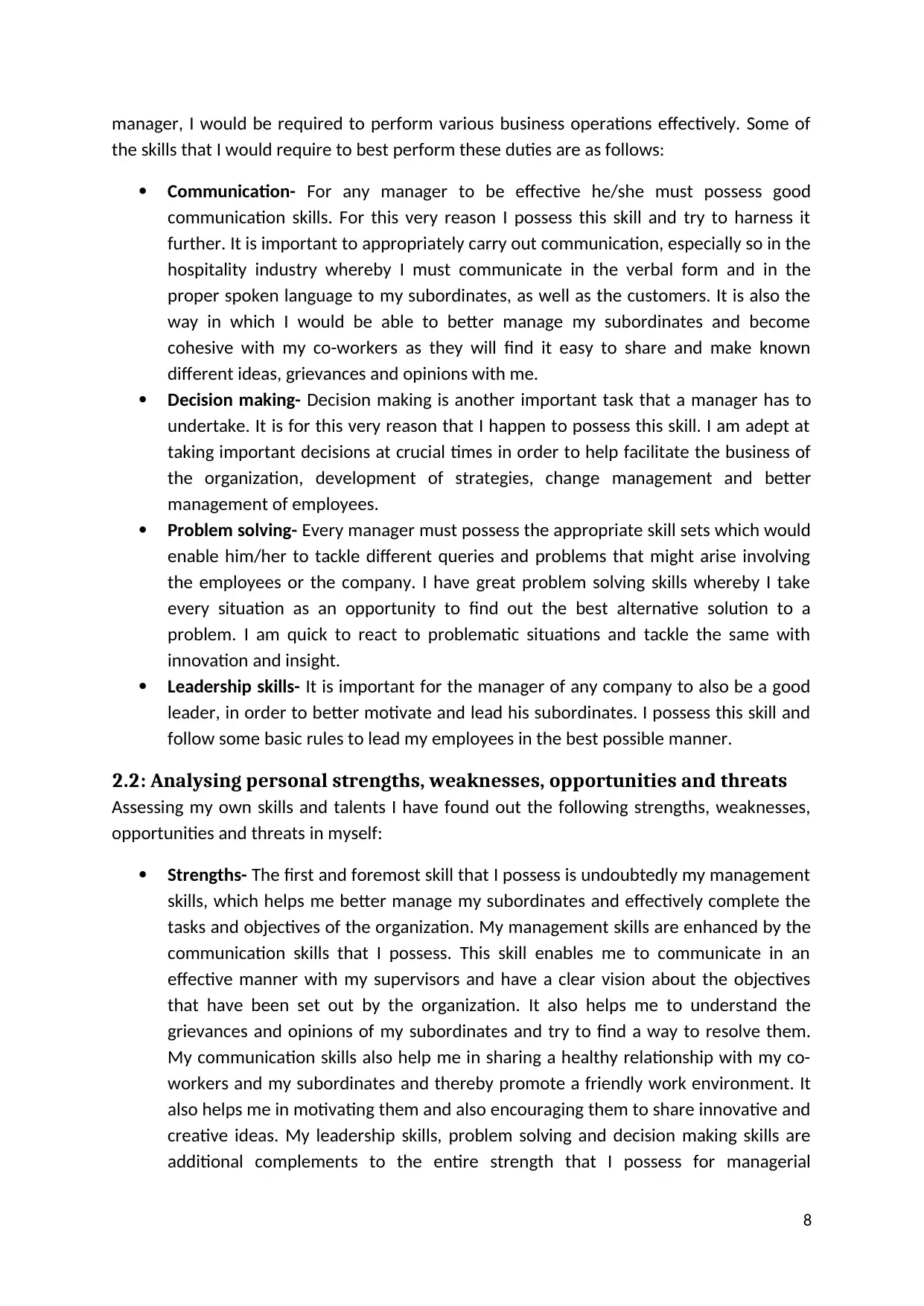
manager, I would be required to perform various business operations effectively. Some of
the skills that I would require to best perform these duties are as follows:
Communication- For any manager to be effective he/she must possess good
communication skills. For this very reason I possess this skill and try to harness it
further. It is important to appropriately carry out communication, especially so in the
hospitality industry whereby I must communicate in the verbal form and in the
proper spoken language to my subordinates, as well as the customers. It is also the
way in which I would be able to better manage my subordinates and become
cohesive with my co-workers as they will find it easy to share and make known
different ideas, grievances and opinions with me.
Decision making- Decision making is another important task that a manager has to
undertake. It is for this very reason that I happen to possess this skill. I am adept at
taking important decisions at crucial times in order to help facilitate the business of
the organization, development of strategies, change management and better
management of employees.
Problem solving- Every manager must possess the appropriate skill sets which would
enable him/her to tackle different queries and problems that might arise involving
the employees or the company. I have great problem solving skills whereby I take
every situation as an opportunity to find out the best alternative solution to a
problem. I am quick to react to problematic situations and tackle the same with
innovation and insight.
Leadership skills- It is important for the manager of any company to also be a good
leader, in order to better motivate and lead his subordinates. I possess this skill and
follow some basic rules to lead my employees in the best possible manner.
2.2: Analysing personal strengths, weaknesses, opportunities and threats
Assessing my own skills and talents I have found out the following strengths, weaknesses,
opportunities and threats in myself:
Strengths- The first and foremost skill that I possess is undoubtedly my management
skills, which helps me better manage my subordinates and effectively complete the
tasks and objectives of the organization. My management skills are enhanced by the
communication skills that I possess. This skill enables me to communicate in an
effective manner with my supervisors and have a clear vision about the objectives
that have been set out by the organization. It also helps me to understand the
grievances and opinions of my subordinates and try to find a way to resolve them.
My communication skills also help me in sharing a healthy relationship with my co-
workers and my subordinates and thereby promote a friendly work environment. It
also helps me in motivating them and also encouraging them to share innovative and
creative ideas. My leadership skills, problem solving and decision making skills are
additional complements to the entire strength that I possess for managerial
8
the skills that I would require to best perform these duties are as follows:
Communication- For any manager to be effective he/she must possess good
communication skills. For this very reason I possess this skill and try to harness it
further. It is important to appropriately carry out communication, especially so in the
hospitality industry whereby I must communicate in the verbal form and in the
proper spoken language to my subordinates, as well as the customers. It is also the
way in which I would be able to better manage my subordinates and become
cohesive with my co-workers as they will find it easy to share and make known
different ideas, grievances and opinions with me.
Decision making- Decision making is another important task that a manager has to
undertake. It is for this very reason that I happen to possess this skill. I am adept at
taking important decisions at crucial times in order to help facilitate the business of
the organization, development of strategies, change management and better
management of employees.
Problem solving- Every manager must possess the appropriate skill sets which would
enable him/her to tackle different queries and problems that might arise involving
the employees or the company. I have great problem solving skills whereby I take
every situation as an opportunity to find out the best alternative solution to a
problem. I am quick to react to problematic situations and tackle the same with
innovation and insight.
Leadership skills- It is important for the manager of any company to also be a good
leader, in order to better motivate and lead his subordinates. I possess this skill and
follow some basic rules to lead my employees in the best possible manner.
2.2: Analysing personal strengths, weaknesses, opportunities and threats
Assessing my own skills and talents I have found out the following strengths, weaknesses,
opportunities and threats in myself:
Strengths- The first and foremost skill that I possess is undoubtedly my management
skills, which helps me better manage my subordinates and effectively complete the
tasks and objectives of the organization. My management skills are enhanced by the
communication skills that I possess. This skill enables me to communicate in an
effective manner with my supervisors and have a clear vision about the objectives
that have been set out by the organization. It also helps me to understand the
grievances and opinions of my subordinates and try to find a way to resolve them.
My communication skills also help me in sharing a healthy relationship with my co-
workers and my subordinates and thereby promote a friendly work environment. It
also helps me in motivating them and also encouraging them to share innovative and
creative ideas. My leadership skills, problem solving and decision making skills are
additional complements to the entire strength that I possess for managerial
8
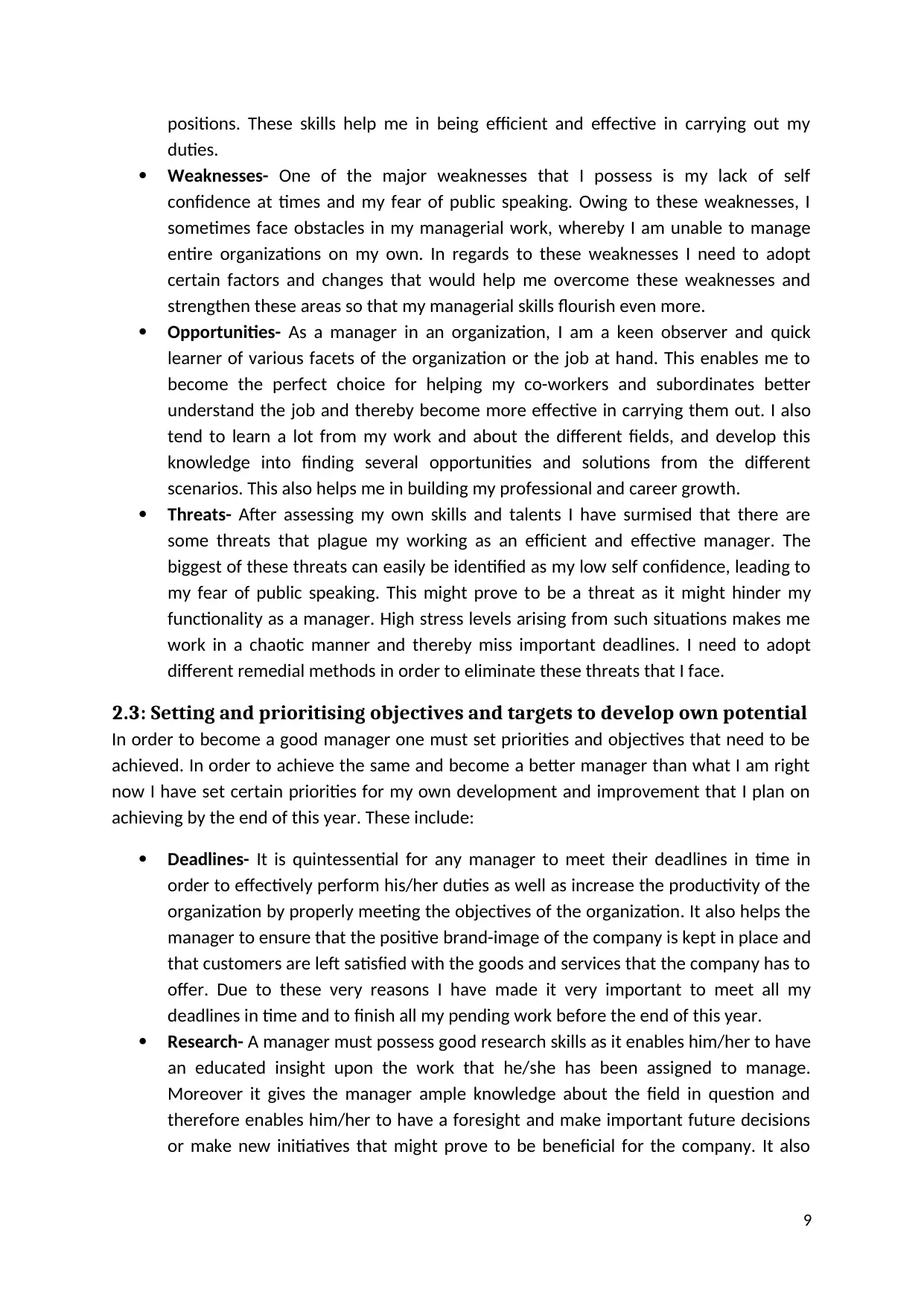
positions. These skills help me in being efficient and effective in carrying out my
duties.
Weaknesses- One of the major weaknesses that I possess is my lack of self
confidence at times and my fear of public speaking. Owing to these weaknesses, I
sometimes face obstacles in my managerial work, whereby I am unable to manage
entire organizations on my own. In regards to these weaknesses I need to adopt
certain factors and changes that would help me overcome these weaknesses and
strengthen these areas so that my managerial skills flourish even more.
Opportunities- As a manager in an organization, I am a keen observer and quick
learner of various facets of the organization or the job at hand. This enables me to
become the perfect choice for helping my co-workers and subordinates better
understand the job and thereby become more effective in carrying them out. I also
tend to learn a lot from my work and about the different fields, and develop this
knowledge into finding several opportunities and solutions from the different
scenarios. This also helps me in building my professional and career growth.
Threats- After assessing my own skills and talents I have surmised that there are
some threats that plague my working as an efficient and effective manager. The
biggest of these threats can easily be identified as my low self confidence, leading to
my fear of public speaking. This might prove to be a threat as it might hinder my
functionality as a manager. High stress levels arising from such situations makes me
work in a chaotic manner and thereby miss important deadlines. I need to adopt
different remedial methods in order to eliminate these threats that I face.
2.3: Setting and prioritising objectives and targets to develop own potential
In order to become a good manager one must set priorities and objectives that need to be
achieved. In order to achieve the same and become a better manager than what I am right
now I have set certain priorities for my own development and improvement that I plan on
achieving by the end of this year. These include:
Deadlines- It is quintessential for any manager to meet their deadlines in time in
order to effectively perform his/her duties as well as increase the productivity of the
organization by properly meeting the objectives of the organization. It also helps the
manager to ensure that the positive brand-image of the company is kept in place and
that customers are left satisfied with the goods and services that the company has to
offer. Due to these very reasons I have made it very important to meet all my
deadlines in time and to finish all my pending work before the end of this year.
Research- A manager must possess good research skills as it enables him/her to have
an educated insight upon the work that he/she has been assigned to manage.
Moreover it gives the manager ample knowledge about the field in question and
therefore enables him/her to have a foresight and make important future decisions
or make new initiatives that might prove to be beneficial for the company. It also
9
duties.
Weaknesses- One of the major weaknesses that I possess is my lack of self
confidence at times and my fear of public speaking. Owing to these weaknesses, I
sometimes face obstacles in my managerial work, whereby I am unable to manage
entire organizations on my own. In regards to these weaknesses I need to adopt
certain factors and changes that would help me overcome these weaknesses and
strengthen these areas so that my managerial skills flourish even more.
Opportunities- As a manager in an organization, I am a keen observer and quick
learner of various facets of the organization or the job at hand. This enables me to
become the perfect choice for helping my co-workers and subordinates better
understand the job and thereby become more effective in carrying them out. I also
tend to learn a lot from my work and about the different fields, and develop this
knowledge into finding several opportunities and solutions from the different
scenarios. This also helps me in building my professional and career growth.
Threats- After assessing my own skills and talents I have surmised that there are
some threats that plague my working as an efficient and effective manager. The
biggest of these threats can easily be identified as my low self confidence, leading to
my fear of public speaking. This might prove to be a threat as it might hinder my
functionality as a manager. High stress levels arising from such situations makes me
work in a chaotic manner and thereby miss important deadlines. I need to adopt
different remedial methods in order to eliminate these threats that I face.
2.3: Setting and prioritising objectives and targets to develop own potential
In order to become a good manager one must set priorities and objectives that need to be
achieved. In order to achieve the same and become a better manager than what I am right
now I have set certain priorities for my own development and improvement that I plan on
achieving by the end of this year. These include:
Deadlines- It is quintessential for any manager to meet their deadlines in time in
order to effectively perform his/her duties as well as increase the productivity of the
organization by properly meeting the objectives of the organization. It also helps the
manager to ensure that the positive brand-image of the company is kept in place and
that customers are left satisfied with the goods and services that the company has to
offer. Due to these very reasons I have made it very important to meet all my
deadlines in time and to finish all my pending work before the end of this year.
Research- A manager must possess good research skills as it enables him/her to have
an educated insight upon the work that he/she has been assigned to manage.
Moreover it gives the manager ample knowledge about the field in question and
therefore enables him/her to have a foresight and make important future decisions
or make new initiatives that might prove to be beneficial for the company. It also
9
⊘ This is a preview!⊘
Do you want full access?
Subscribe today to unlock all pages.

Trusted by 1+ million students worldwide
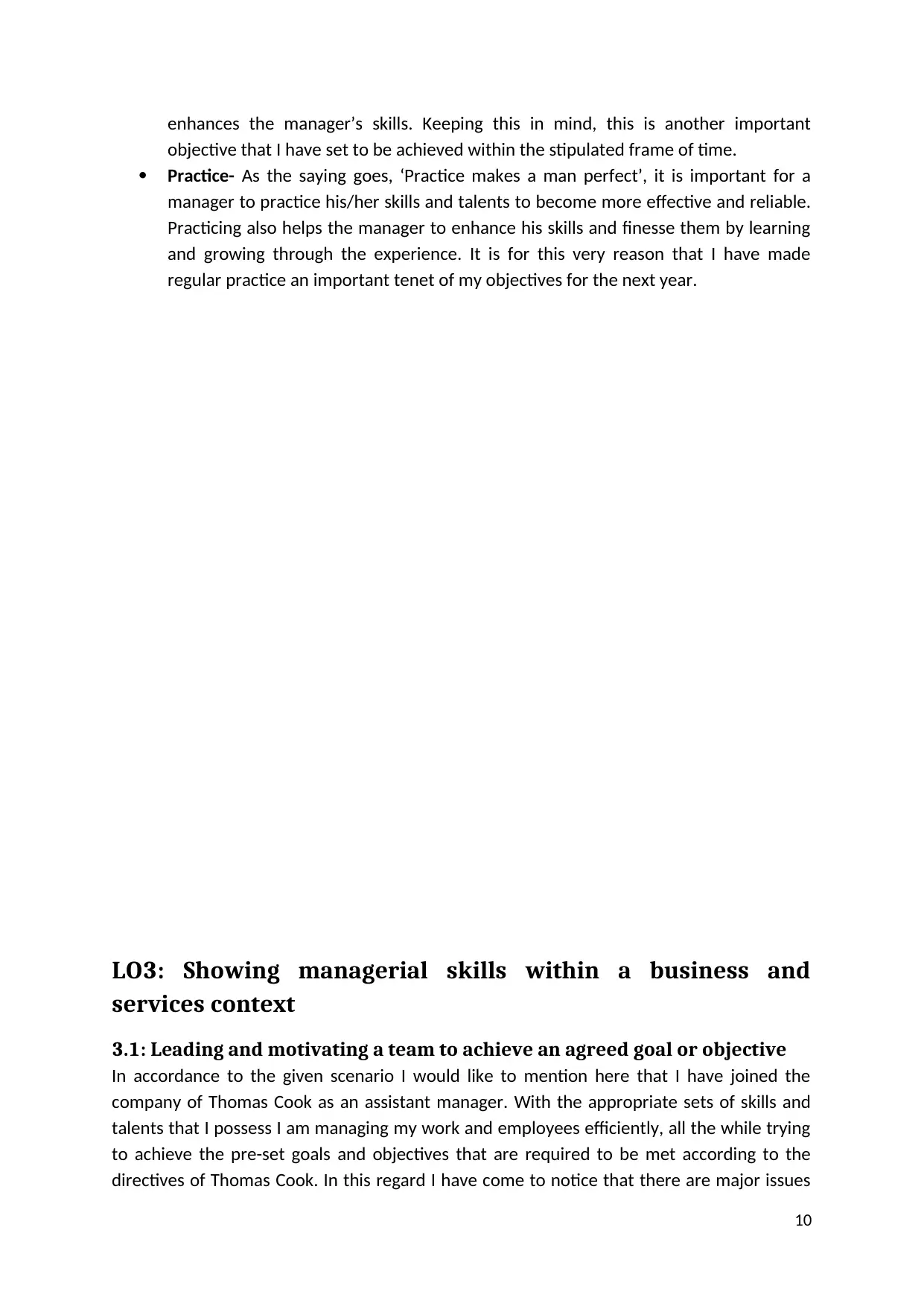
enhances the manager’s skills. Keeping this in mind, this is another important
objective that I have set to be achieved within the stipulated frame of time.
Practice- As the saying goes, ‘Practice makes a man perfect’, it is important for a
manager to practice his/her skills and talents to become more effective and reliable.
Practicing also helps the manager to enhance his skills and finesse them by learning
and growing through the experience. It is for this very reason that I have made
regular practice an important tenet of my objectives for the next year.
LO3: Showing managerial skills within a business and
services context
3.1: Leading and motivating a team to achieve an agreed goal or objective
In accordance to the given scenario I would like to mention here that I have joined the
company of Thomas Cook as an assistant manager. With the appropriate sets of skills and
talents that I possess I am managing my work and employees efficiently, all the while trying
to achieve the pre-set goals and objectives that are required to be met according to the
directives of Thomas Cook. In this regard I have come to notice that there are major issues
10
objective that I have set to be achieved within the stipulated frame of time.
Practice- As the saying goes, ‘Practice makes a man perfect’, it is important for a
manager to practice his/her skills and talents to become more effective and reliable.
Practicing also helps the manager to enhance his skills and finesse them by learning
and growing through the experience. It is for this very reason that I have made
regular practice an important tenet of my objectives for the next year.
LO3: Showing managerial skills within a business and
services context
3.1: Leading and motivating a team to achieve an agreed goal or objective
In accordance to the given scenario I would like to mention here that I have joined the
company of Thomas Cook as an assistant manager. With the appropriate sets of skills and
talents that I possess I am managing my work and employees efficiently, all the while trying
to achieve the pre-set goals and objectives that are required to be met according to the
directives of Thomas Cook. In this regard I have come to notice that there are major issues
10
Paraphrase This Document
Need a fresh take? Get an instant paraphrase of this document with our AI Paraphraser
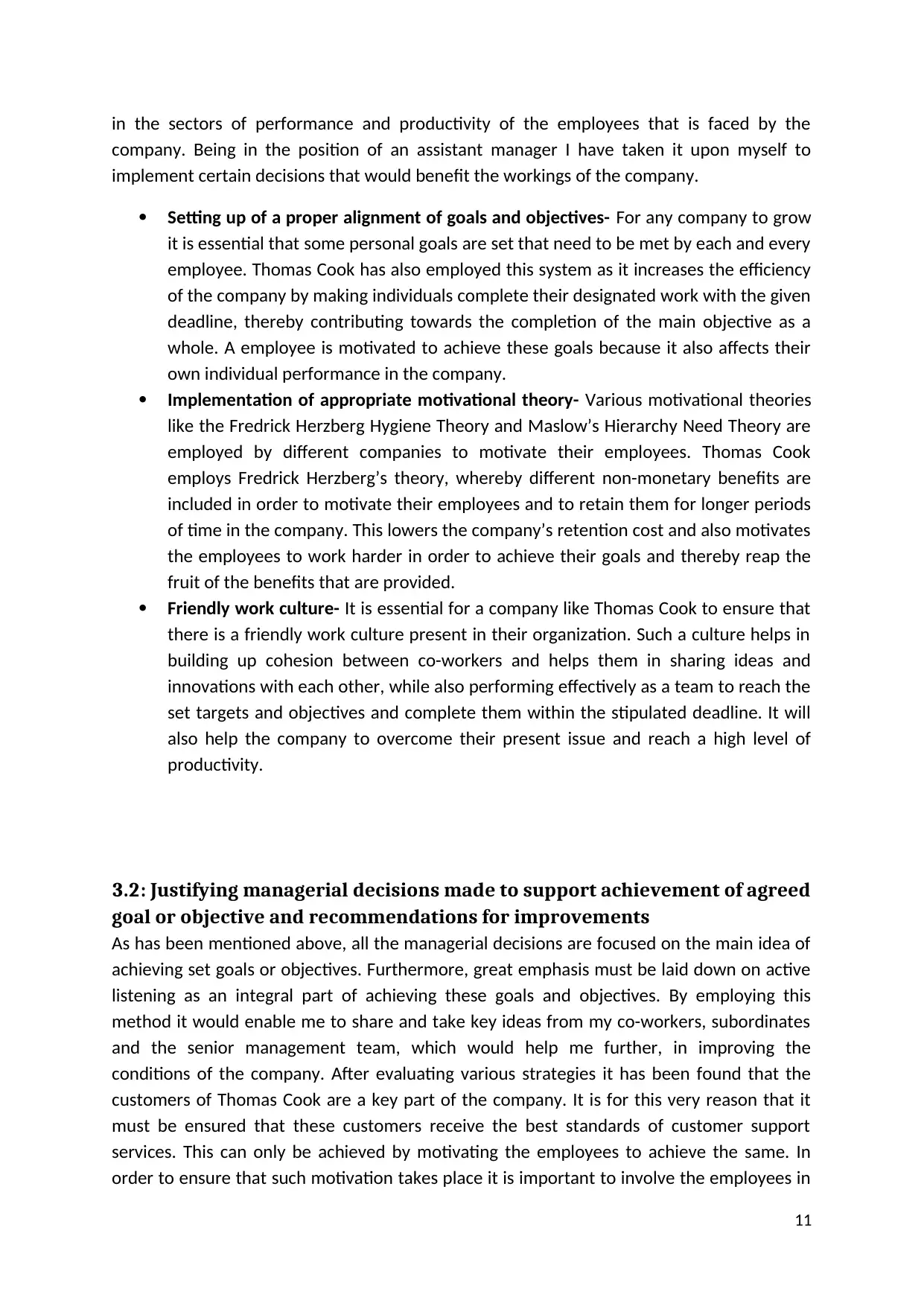
in the sectors of performance and productivity of the employees that is faced by the
company. Being in the position of an assistant manager I have taken it upon myself to
implement certain decisions that would benefit the workings of the company.
Setting up of a proper alignment of goals and objectives- For any company to grow
it is essential that some personal goals are set that need to be met by each and every
employee. Thomas Cook has also employed this system as it increases the efficiency
of the company by making individuals complete their designated work with the given
deadline, thereby contributing towards the completion of the main objective as a
whole. A employee is motivated to achieve these goals because it also affects their
own individual performance in the company.
Implementation of appropriate motivational theory- Various motivational theories
like the Fredrick Herzberg Hygiene Theory and Maslow’s Hierarchy Need Theory are
employed by different companies to motivate their employees. Thomas Cook
employs Fredrick Herzberg’s theory, whereby different non-monetary benefits are
included in order to motivate their employees and to retain them for longer periods
of time in the company. This lowers the company’s retention cost and also motivates
the employees to work harder in order to achieve their goals and thereby reap the
fruit of the benefits that are provided.
Friendly work culture- It is essential for a company like Thomas Cook to ensure that
there is a friendly work culture present in their organization. Such a culture helps in
building up cohesion between co-workers and helps them in sharing ideas and
innovations with each other, while also performing effectively as a team to reach the
set targets and objectives and complete them within the stipulated deadline. It will
also help the company to overcome their present issue and reach a high level of
productivity.
3.2: Justifying managerial decisions made to support achievement of agreed
goal or objective and recommendations for improvements
As has been mentioned above, all the managerial decisions are focused on the main idea of
achieving set goals or objectives. Furthermore, great emphasis must be laid down on active
listening as an integral part of achieving these goals and objectives. By employing this
method it would enable me to share and take key ideas from my co-workers, subordinates
and the senior management team, which would help me further, in improving the
conditions of the company. After evaluating various strategies it has been found that the
customers of Thomas Cook are a key part of the company. It is for this very reason that it
must be ensured that these customers receive the best standards of customer support
services. This can only be achieved by motivating the employees to achieve the same. In
order to ensure that such motivation takes place it is important to involve the employees in
11
company. Being in the position of an assistant manager I have taken it upon myself to
implement certain decisions that would benefit the workings of the company.
Setting up of a proper alignment of goals and objectives- For any company to grow
it is essential that some personal goals are set that need to be met by each and every
employee. Thomas Cook has also employed this system as it increases the efficiency
of the company by making individuals complete their designated work with the given
deadline, thereby contributing towards the completion of the main objective as a
whole. A employee is motivated to achieve these goals because it also affects their
own individual performance in the company.
Implementation of appropriate motivational theory- Various motivational theories
like the Fredrick Herzberg Hygiene Theory and Maslow’s Hierarchy Need Theory are
employed by different companies to motivate their employees. Thomas Cook
employs Fredrick Herzberg’s theory, whereby different non-monetary benefits are
included in order to motivate their employees and to retain them for longer periods
of time in the company. This lowers the company’s retention cost and also motivates
the employees to work harder in order to achieve their goals and thereby reap the
fruit of the benefits that are provided.
Friendly work culture- It is essential for a company like Thomas Cook to ensure that
there is a friendly work culture present in their organization. Such a culture helps in
building up cohesion between co-workers and helps them in sharing ideas and
innovations with each other, while also performing effectively as a team to reach the
set targets and objectives and complete them within the stipulated deadline. It will
also help the company to overcome their present issue and reach a high level of
productivity.
3.2: Justifying managerial decisions made to support achievement of agreed
goal or objective and recommendations for improvements
As has been mentioned above, all the managerial decisions are focused on the main idea of
achieving set goals or objectives. Furthermore, great emphasis must be laid down on active
listening as an integral part of achieving these goals and objectives. By employing this
method it would enable me to share and take key ideas from my co-workers, subordinates
and the senior management team, which would help me further, in improving the
conditions of the company. After evaluating various strategies it has been found that the
customers of Thomas Cook are a key part of the company. It is for this very reason that it
must be ensured that these customers receive the best standards of customer support
services. This can only be achieved by motivating the employees to achieve the same. In
order to ensure that such motivation takes place it is important to involve the employees in
11
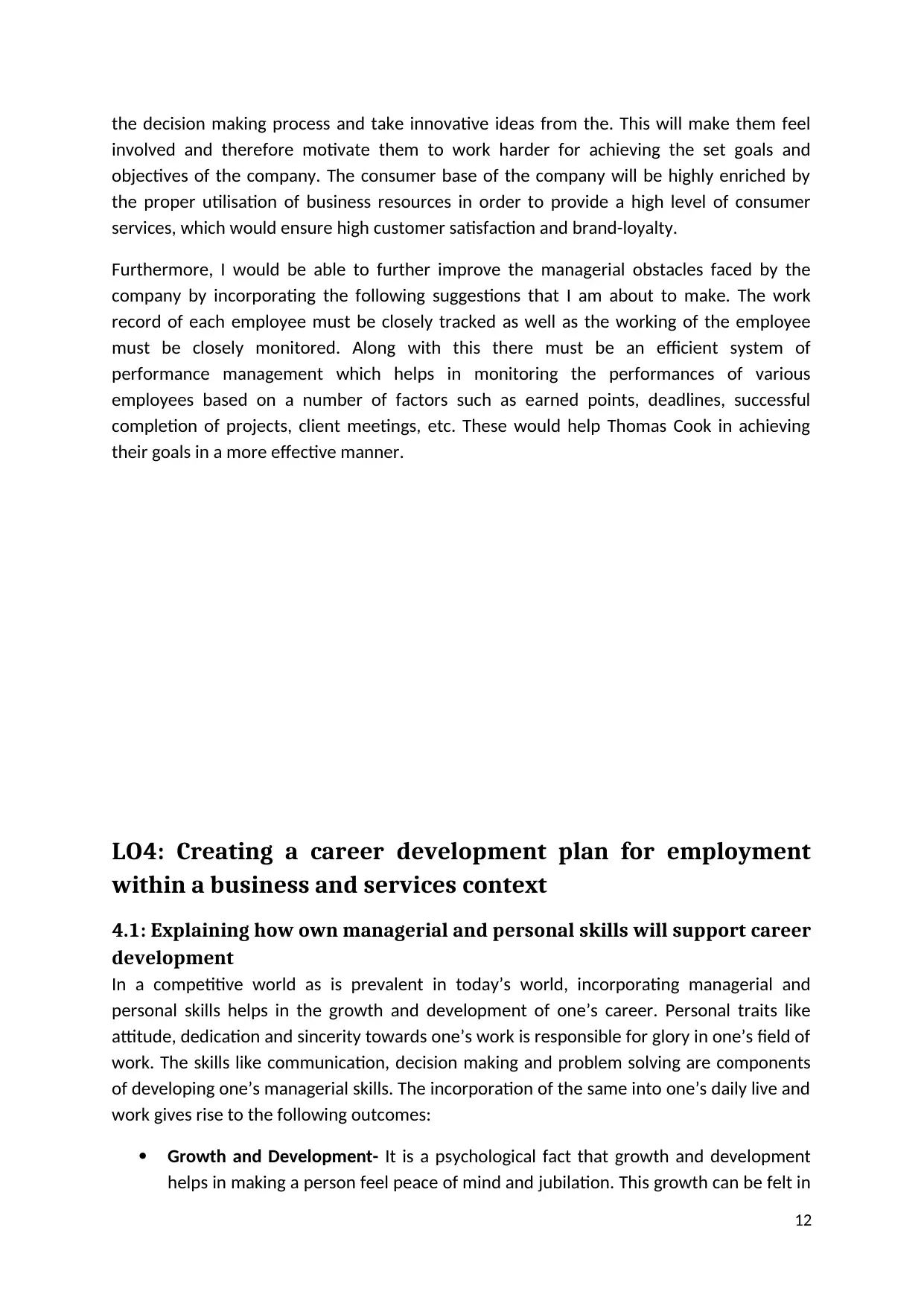
the decision making process and take innovative ideas from the. This will make them feel
involved and therefore motivate them to work harder for achieving the set goals and
objectives of the company. The consumer base of the company will be highly enriched by
the proper utilisation of business resources in order to provide a high level of consumer
services, which would ensure high customer satisfaction and brand-loyalty.
Furthermore, I would be able to further improve the managerial obstacles faced by the
company by incorporating the following suggestions that I am about to make. The work
record of each employee must be closely tracked as well as the working of the employee
must be closely monitored. Along with this there must be an efficient system of
performance management which helps in monitoring the performances of various
employees based on a number of factors such as earned points, deadlines, successful
completion of projects, client meetings, etc. These would help Thomas Cook in achieving
their goals in a more effective manner.
LO4: Creating a career development plan for employment
within a business and services context
4.1: Explaining how own managerial and personal skills will support career
development
In a competitive world as is prevalent in today’s world, incorporating managerial and
personal skills helps in the growth and development of one’s career. Personal traits like
attitude, dedication and sincerity towards one’s work is responsible for glory in one’s field of
work. The skills like communication, decision making and problem solving are components
of developing one’s managerial skills. The incorporation of the same into one’s daily live and
work gives rise to the following outcomes:
Growth and Development- It is a psychological fact that growth and development
helps in making a person feel peace of mind and jubilation. This growth can be felt in
12
involved and therefore motivate them to work harder for achieving the set goals and
objectives of the company. The consumer base of the company will be highly enriched by
the proper utilisation of business resources in order to provide a high level of consumer
services, which would ensure high customer satisfaction and brand-loyalty.
Furthermore, I would be able to further improve the managerial obstacles faced by the
company by incorporating the following suggestions that I am about to make. The work
record of each employee must be closely tracked as well as the working of the employee
must be closely monitored. Along with this there must be an efficient system of
performance management which helps in monitoring the performances of various
employees based on a number of factors such as earned points, deadlines, successful
completion of projects, client meetings, etc. These would help Thomas Cook in achieving
their goals in a more effective manner.
LO4: Creating a career development plan for employment
within a business and services context
4.1: Explaining how own managerial and personal skills will support career
development
In a competitive world as is prevalent in today’s world, incorporating managerial and
personal skills helps in the growth and development of one’s career. Personal traits like
attitude, dedication and sincerity towards one’s work is responsible for glory in one’s field of
work. The skills like communication, decision making and problem solving are components
of developing one’s managerial skills. The incorporation of the same into one’s daily live and
work gives rise to the following outcomes:
Growth and Development- It is a psychological fact that growth and development
helps in making a person feel peace of mind and jubilation. This growth can be felt in
12
⊘ This is a preview!⊘
Do you want full access?
Subscribe today to unlock all pages.

Trusted by 1+ million students worldwide
1 out of 15
Related Documents
Your All-in-One AI-Powered Toolkit for Academic Success.
+13062052269
info@desklib.com
Available 24*7 on WhatsApp / Email
![[object Object]](/_next/static/media/star-bottom.7253800d.svg)
Unlock your academic potential
Copyright © 2020–2026 A2Z Services. All Rights Reserved. Developed and managed by ZUCOL.




